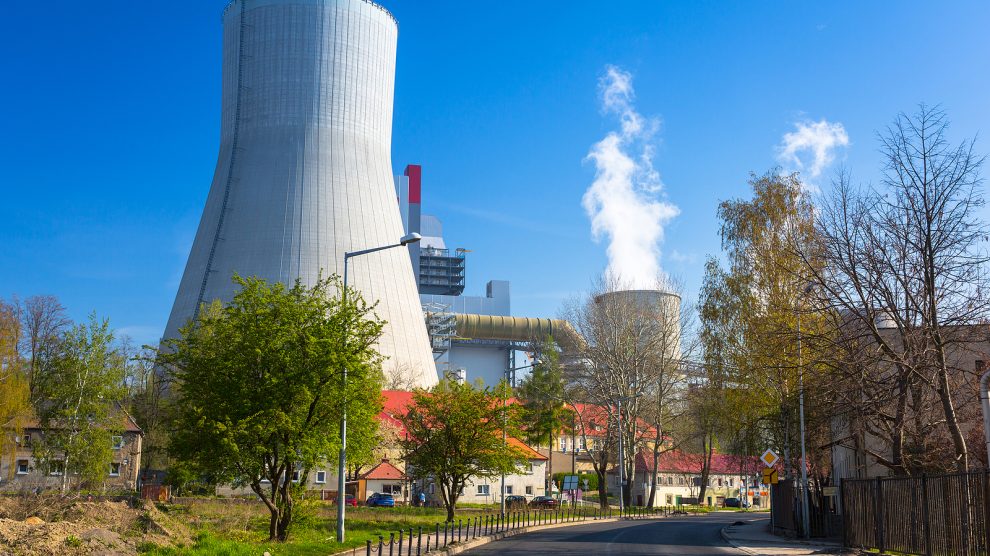An agreement between the Polish government and the country’s coal miners is “very unlikely” to get the green light in Brussels, says the environmental law group ClientEarth.
The Polish government and the country’s trade unions on May 28 signed a deal to reform the mining industry, agreeing to maintain hard coal mining operations until 2049 with state aid to be granted to fund the operations of unprofitable state-owned mining companies, including the Polish Mining Group – the largest coal mining operator in Europe.
- Poland set to defy ECJ ruling to close Turów coal mine
- Greenpeace steps up legal fight against Poland’s use of coal
- A Polish ‘mega port’ project is worrying German environmentalists
The document ensures public funds to finance severance and bridge instruments for laid-off miners as well as energy transformation aid for the southern Silesia region.
In 2020, the share of coal in Poland’s energy mix fell to 65 per cent, down from an average of over 80 per cent across the last decade.
The deal still needs the European Commission’s approval, however, as it involves state aid. The Commission is currently examining the climate impact of state aid in order to align competition rules with the European Green Deal and its goal of reaching climate neutrality by 2050.
The EU’s Just Transition Fund is a 17.5 billion euros chunk of the EU budget and Covid-19 recovery fund that has been allocated to help regions reduce fossil fuel industries and replace them with green enterprises, as the EU overhauls its economy to become climate neutral.
Poland employs more than half of Europe’s coal industry workforce and is in line for the biggest share of the fund.
Environmental law group ClientEarth says, however, that its research suggests the deal is unlikely to get the European Commission’s approval due to state aid compliance issues.
“The negotiations have been quite surreal – all involved are burying their head in the sand and pretending to not see the writing on the wall,” says ClientEarth lawyer Wojciech Kukuła, who authored the analysis. “Not only is this agreement artificially keeping the dying coal industry afloat, it’s also very unlikely to be approved at EU level.”
“It’s not the first time that Poland has knocked on the EU’s door asking the bloc to subsidise its coal mines,” says Kukuła. “But the government’s time would be better spent thinking about a fair transition for coal regions and coal workers.”
ClientEarth is currently involved in a court case against the operators of the Bełchatów coal plant, the country’s biggest power plant, based on its climate harm and environmental impacts.
Research unambiguous
In a report published last December, ClientEarth and think tank Instrat argued that the Polish government’s provisional plan to restructure the country’s coal assets will bring it way out of line with the EU’s climate commitments.
In a previous a report published in July 2020, ClientEarth and WiseEuropa, another think tank, found that the financial support from the government, nearly 1.6 billion euros per year, does not boost the development of green energy as most of it goes to coal plants.
Under the last state aid programme for Polish mining, negotiated in 2018, the sector is set to receive almost three billion euros in subsidies up to 2023. In April, the Polish Mining Group received a 220 million euros loan from the government under the temporary coronavirus state aid rules.
The case of Turów
Poland’s plan to extend the life of a coal mine in Turów until 2044 could mean the region will not get access to the EU’s flagship green transition fund, the Commission said recently.
“That certainly puts at risk the use of the Just Transition Fund to support this region where, as we can see, transition is not planned from now until 2030,” according to Commission spokesperson Vivian Loonela.
The European Court of Justice (ECJ) is due to decide in the coming months if the Turów mine must close immediately, following a lawsuit filed by Czechia in February.
The lawsuit alleges that Warsaw had violated EU law with an earlier extension of mining at Turów until 2026.
Earlier in May, the ECJ ruled that the mine, whose accompanying power plant generates around seven per cent of Poland’s energy, must cease operations while the court processes the Czech lawsuit.
Poland has nevertheless so far refused to comply with the ruling.
Unlike many news and information platforms, Emerging Europe is free to read, and always will be. There is no paywall here. We are independent, not affiliated with nor representing any political party or business organisation. We want the very best for emerging Europe, nothing more, nothing less. Your support will help us continue to spread the word about this amazing region.
You can contribute here. Thank you.








Add Comment